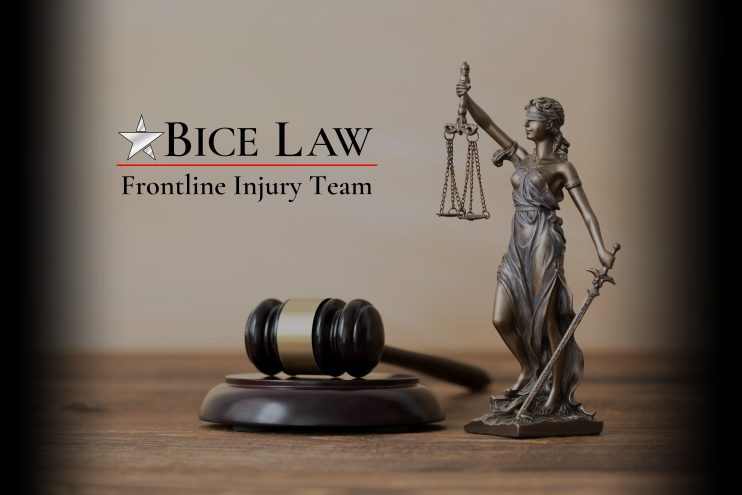Injured at work near Charlotte?
 If you have been injured on the job and need an experienced Charlotte Worker’s Compensation Lawyer, Bice Law is the firm to call! Bice Law is a personal injury law firm with a Charlotte Worker’s Compensation Lawyer who has expertise in successfully handling worker’s comp claims. Being out of work is stressful enough without having to navigate the difficulties of a worker’s compensation claim.
If you have been injured on the job and need an experienced Charlotte Worker’s Compensation Lawyer, Bice Law is the firm to call! Bice Law is a personal injury law firm with a Charlotte Worker’s Compensation Lawyer who has expertise in successfully handling worker’s comp claims. Being out of work is stressful enough without having to navigate the difficulties of a worker’s compensation claim.
At Bice Law, our focus is what we can do for our clients and not what our clients do for us. We take the worry from our clients and fight for them every step of the way to ensure they get the maximum amount of benefits and compensation from a worker’s comp claim. We fight for our clients from consultation to settlement and we don’t get paid until we win! Call Bice Law today for a FREE CONSULTATION with an experienced Charlotte Worker’s Compensation Lawyer. We have helped countless victims of work-related injuries, and our results are measured by the settlements we’ve won for our clients. Call Bice Law today, we are here to help you with your Charlotte, North Carolina worker’s comp claim!
If you have been injured on the job in Charlotte, North Carolina and you were denied worker’s compensation benefits or are not getting the benefits you need, contact Bice Law. Bice Law is a Charlotte injury law firm that specializes in worker’s compensation injuries and other serious personal injuries caused by the negligence of another. Our Frontline Injury Team has the experience needed to fight and get you the maximum amount of worker’s compensation benefits available for your on-the-job injury in Charlotte.
Bice Law is a personal injury firm in Charlotte with extensive experience handling worker’s compensation claims and a success rate proven by the benefits and settlements that we have won for our worker’s compensation clients. Our firm has helped countless victims injured while on the job. Let Bice Law help you!
What To Do After Being Injured At Work in Charlotte
Suffering a work injury can be a challenging experience, but knowing what steps to take afterward can make a significant difference in your recovery and overall well-being. From seeking medical attention promptly to engaging a Charlotte workers’ compensation attorney and documenting every detail, each step plays a vital role in ensuring you receive the care, support, and compensation you deserve. By following these crucial steps, you’ll be better equipped to navigate the complexities of the aftermath of a work injury in Charlotte.
Seek Immediate Medical Attention. The health and safety of the injured worker should always be the top priority. Regardless of the severity of the injury, seeking medical attention promptly is essential. If the injury is serious, call 911 or visit the nearest emergency room. Even seemingly minor injuries should be evaluated by a medical professional to ensure they don’t worsen over time.
 Report the Injury to Your Employer. After seeking medical attention, it’s vital to report the injury to your employer as soon as possible. This report initiates the workers’ compensation process. Provide accurate details about the incident, including the location, time, and circumstances leading to the injury. Reporting the injury promptly helps establish a clear record of the event.
Report the Injury to Your Employer. After seeking medical attention, it’s vital to report the injury to your employer as soon as possible. This report initiates the workers’ compensation process. Provide accurate details about the incident, including the location, time, and circumstances leading to the injury. Reporting the injury promptly helps establish a clear record of the event.
Document the Incident. Take photographs of the accident site, your injuries, and any contributing factors. These visual records can serve as valuable evidence during the claims process. Additionally, write down a detailed account of what happened while the memories are fresh. Include information about any witnesses present at the scene.
Consult a Workers’ Compensation Attorney. Enlisting the assistance of a Charlotte workers’ compensation attorney can significantly ease the process of filing a claim and navigating legal complexities. These experienced professionals can guide you through the paperwork, ensure that your rights are protected, and represent your interests if disputes arise.
File a Workers’ Compensation Claim. Follow your employer’s guidelines for filing a workers’ compensation claim. Typically, this involves submitting a claim form to your employer’s human resources or workers’ compensation department. Include all necessary documentation, such as medical reports, bills, and any other evidence that supports your claim.
Follow Medical Advice and Attend Appointments. Adhere to the treatment plan prescribed by your healthcare provider. Attend all follow-up appointments, therapies, and treatments recommended. This not only aids in your recovery but also demonstrates your commitment to regaining your health.
Keep Detailed Records. Maintain a comprehensive record of all medical treatments, expenses, and correspondence related to your injury and the workers’ compensation claim. This documentation can serve as essential evidence should any disputes arise during the claims process.
Communicate with Your Employer and Insurer. Maintain open communication with your employer and the workers’ compensation insurer. Provide updates on your medical progress and any changes in your condition. Promptly respond to any requests for information or documentation.
Know Your Rights. Educate yourself about your rights as an injured worker. Understand the benefits you are entitled to under the workers’ compensation system, including medical coverage, wage replacement, and disability benefits. Knowledge empowers you to advocate for yourself effectively.
Explore Return-to-Work Options. As you progress in your recovery, discuss potential return-to-work options with your healthcare provider, employer, and workers’ compensation attorney. Depending on your condition, a modified work arrangement or transitional duties might be considered to facilitate a smooth transition back to your job.
Does Your Work Injury Qualify For Worker’s Compensation?
If you have been injured while working for an employer in Charlotte, you may be entitled to workers’ compensation benefits. Accidents and injuries can occur in any workplace, leaving employees with physical and financial burdens. Fortunately, North Carolina has established a comprehensive workers’ compensation system to provide assistance to those who suffer work-related injuries or illnesses. Understanding which injuries are accepted under North Carolina workers’ compensation benefits is crucial for both employees and employers. In order to receive workers’ compensation, you must have been employed at the time you are injured, and the injury must be a direct result of the employment. Your injuries must be caused by whatever tasks you have been assigned while employed.
Qualifying Work Injuries

Accidental Injuries: Most commonly, North Carolina workers’ compensation benefits cover injuries resulting from accidents that occur in the workplace. These injuries can encompass a wide range of situations, from slip and fall accidents to injuries caused by falling objects or machinery malfunctions. Essentially, if the injury occurs during the course of employment and arises out of job-related duties, it is typically eligible for workers’ compensation benefits.
Repetitive Stress Injuries: Not all workplace injuries are the result of sudden accidents. Repetitive stress injuries, also known as cumulative trauma disorders, are covered under North Carolina’s workers’ compensation system. These injuries often develop over time due to repeated motions or strain at work. Examples include carpal tunnel syndrome from constant typing or tendonitis from repetitive lifting.
Occupational Diseases: Workers’ compensation benefits in North Carolina also extend to cover occupational diseases. These are illnesses or health conditions that develop due to workplace exposures or conditions. Examples include respiratory conditions caused by exposure to toxic chemicals, asbestosis from asbestos exposure, and hearing loss due to prolonged exposure to loud noise levels at work.
Aggravation of Pre-existing Conditions: North Carolina’s workers’ compensation system recognizes that pre-existing medical conditions can be aggravated or worsened by workplace injuries or activities. In such cases, if the work-related factors contribute to the worsening of a pre-existing condition, the injured employee may be eligible for workers’ compensation benefits.
Mental Health Injuries: Mental health injuries are also eligible for workers’ compensation benefits in North Carolina. However, these cases can be complex and often require evidence to demonstrate that the mental health condition is a direct result of work-related stressors or traumatic events on the job.
Fatal Injuries: In tragic cases where a work-related injury or illness leads to the death of an employee, workers’ compensation benefits can extend to the deceased worker’s dependents. These benefits may include compensation for funeral expenses and financial support for surviving family members.
It’s important to note that, in North Carolina, the key factor in determining eligibility for workers’ compensation benefits is whether the injury or illness arose out of and in the course of employment. This means that the injury must be directly related to job duties or conditions. Additionally, employees are generally required to report their injuries to their employers promptly, usually within 30 days, to be eligible for benefits.
Factors Affecting Eligibility. It’s important to note that qualifying for workers’ compensation isn’t solely determined by the nature of the injury. Several factors can influence eligibility, such as:
Employment Status: Generally, only employees are eligible for workers’ compensation benefits, not independent contractors or volunteers.
Notification: Reporting the injury to the employer within the specified timeframe is crucial. Failing to report the injury promptly might impact eligibility.
Causation: The injury must be directly linked to work-related tasks or conditions. If the injury occurs outside the scope of work activities, it might not qualify.
Time and Place: The injury must occur during work hours and at a location where work duties are typically performed.
Adherence to Procedures: Following the proper procedures for filing a workers’ compensation claim is essential. This includes providing necessary documentation and cooperating with medical evaluations.
Understanding the criteria for eligibility, as well as adhering to reporting and filing procedures, ensures that injured workers receive the necessary benefits to aid in their recovery and well-being. If you’ve been injured at work and believe you might qualify for worker’s compensation, contact Bice Law! Our Frontline Injury Team can help you navigate the workers’ compensation process effectively.
Can I see my own doctor for a work injury?
When you sustain a work-related injury, the process of seeking medical treatment can raise questions about whether you can see your own doctor or if you’re required to visit a physician selected by your employer’s workers’ compensation insurance. Understanding your rights and options in this matter is crucial to ensure proper medical care and a smooth workers’ compensation claim process.
Your Right to Choose. In many cases, you have the right to choose your own doctor for treating a work-related injury. However, this may vary depending on the specific workers’ compensation laws in your state. It’s important to check your state’s regulations to know your rights accurately.
Employer’s Choice of Doctor. In some cases, your employer’s workers’ compensation insurance might have a preferred provider network, and you may be required to seek medical treatment from a doctor within that network. This is common in situations where the insurance company is responsible for covering your medical expenses.
Second Opinions. If you choose to see your own doctor but the insurance company requires an evaluation by one of their doctors, you may be entitled to a second opinion from your chosen physician. However, this process can be subject to certain rules and regulations, so it’s important to consult with an experienced Charlotte worker’s compensation attorney who is well-versed on your state’s workers’ compensation guidelines.
Communication is Key. Whether you choose your own doctor or follow your employer’s preferred provider network, communication is crucial. Notify your employer and the insurance company about your choice of doctor and make sure all medical records and bills are properly documented.
Understanding your rights and responsibilities in this matter is essential to ensure you receive appropriate medical care and that your workers’ compensation claim proceeds smoothly. Weigh the pros and cons of seeing your own doctor versus an employer-selected physician, and always ensure clear communication with all relevant parties to ensure your well-being and your claim’s success. If you’re unsure about your rights or how to proceed, consulting with a Charlotte injury attorney experienced in North Carolina workers’ compensation law can provide valuable guidance.
Worker’s Compensation Lawyer in Charlotte
 Suffering a workplace injury can be a life-altering experience, impacting both your physical well-being and financial stability. If you have been injured at work in Charlotte, North Carolina, seeking the assistance of a dedicated Charlotte worker’s compensation attorney is crucial. These legal professionals specialize in navigating the complex world of worker’s compensation claims, ensuring that you receive the benefits you deserve while focusing on your recovery. In this article, we will delve into the reasons why hiring a Charlotte worker’s compensation attorney is essential when dealing with workplace injuries.
Suffering a workplace injury can be a life-altering experience, impacting both your physical well-being and financial stability. If you have been injured at work in Charlotte, North Carolina, seeking the assistance of a dedicated Charlotte worker’s compensation attorney is crucial. These legal professionals specialize in navigating the complex world of worker’s compensation claims, ensuring that you receive the benefits you deserve while focusing on your recovery. In this article, we will delve into the reasons why hiring a Charlotte worker’s compensation attorney is essential when dealing with workplace injuries.
Navigating Complex Legal Procedures. Worker’s compensation laws and regulations can be intricate and overwhelming for individuals unfamiliar with the legal system. Hiring an experienced Charlotte worker’s compensation attorney ensures that you have a knowledgeable guide throughout the process. These attorneys understand the nuances of North Carolina’s worker’s compensation laws, helping you navigate through the required paperwork, deadlines, and procedural intricacies. By having an attorney by your side, you can avoid costly mistakes that could jeopardize your claim’s success.
Maximizing Benefits. Receiving fair compensation for your injuries and related expenses is a primary concern. A skilled worker’s compensation attorney will assess the extent of your injuries, medical treatments, and potential long-term effects to determine the appropriate compensation you should receive. They will work diligently to ensure that you are not shortchanged by insurance companies or employers trying to minimize their financial liability. By seeking professional legal representation, you significantly increase your chances of maximizing your worker’s compensation benefits.
Building a Strong Case. Constructing a solid case is vital for a successful worker’s compensation claim. Attorneys who specialize in worker’s compensation in Charlotte have the expertise to gather and present the necessary evidence to support your claim. They will collaborate with medical experts, collect medical records, document your injuries, and interview witnesses if needed. This comprehensive approach strengthens your case and demonstrates the validity of your injury claims, helping you secure the compensation you deserve.
Negotiating with Insurance Companies. Insurance companies often employ tactics to minimize the compensation they pay out, which can leave injured workers struggling to cover medical expenses and lost wages. A seasoned worker’s compensation attorney in Charlotte is well-versed in negotiating with insurance companies. They can counteract the strategies employed by insurers, ensuring that your rights are upheld and that you receive fair compensation for medical treatments, rehabilitation, lost wages, and potential disability benefits.
Appealing Denied Claims. Unfortunately, not all worker’s compensation claims are approved on the first attempt. If your claim is denied, a worker’s compensation attorney can help you appeal the decision. They will review the denial letter, identify any discrepancies, and compile additional evidence to strengthen your case during the appeals process. Having an attorney guide you through the appeals procedure increases your chances of having the denial overturned and securing the compensation you deserve.
When faced with a workplace injury in Charlotte, North Carolina, the importance of hiring a worker’s compensation attorney cannot be overstated. From navigating complex legal procedures and maximizing benefits to building a strong case and negotiating with insurance companies, these professionals are dedicated to ensuring that your rights are upheld and that you receive the compensation you deserve. By seeking the assistance of a skilled worker’s compensation attorney, you not only protect your financial well-being but also gain a supportive ally as you focus on your recovery and rehabilitation. Bice Law is the worker’s compensation attorney you want on your side after a workplace injury. We have helped countless others in your place. Call the Charlotte Worker’s Compensation Attorney who will fight for you. Call Bice Law today!
What are the Worker’s Compensation Laws in North Carolina?
Workers’ compensation laws in North Carolina serve as a vital safety net for employees who experience work-related injuries or illnesses. These laws ensure that injured workers receive appropriate medical treatment, wage replacement, and other benefits. Almost all employers in North Carolina are required to carry worker’s compensation insurance. This includes both public and private employers, with few exceptions. If you are an employee of one of these covered employers and you suffer an injury or illness related to your job, you may be eligible for worker’s compensation benefits. Understanding the key aspects of North Carolina’s workers’ compensation laws is crucial for both employers and employees.
Coverage and Eligibility. North Carolina’s workers’ compensation laws cover a broad range of employees, including full-time, part-time, and seasonal workers. Most employers with three or more employees are required to provide workers’ compensation insurance, while certain industries may have different thresholds. Agricultural employers and certain smaller businesses may be exempt from this requirement.
Filing a Claim and Time Limitations. In North Carolina, injured workers must report the injury to their employer within 30 days of its occurrence. Failure to do so might result in the loss of workers’ compensation benefits. The injured worker then has up to two years from the date of the injury to file a workers’ compensation claim. It’s crucial to adhere to these timelines to ensure eligibility for benefits.
Dispute Resolution. Disagreements may arise between employees and employers or insurance carriers regarding workers’ compensation claims. In North Carolina, the Industrial Commission serves as the agency responsible for overseeing workers’ compensation matters. If a dispute cannot be resolved through negotiation, mediation, or a formal hearing process is available for parties to present their cases.
Employer Responsibilities. Employers in North Carolina are required to carry workers’ compensation insurance to cover their employees’ potential injuries. Failure to maintain adequate coverage can result in penalties and legal consequences. Employers are also prohibited from retaliating against employees who file workers’ compensation claims.
Statute of Limitations. It’s important to note that there is a time limit for filing a workers’ compensation claim. In North Carolina, the statute of limitations is two years from the date of the injury or illness diagnosis. Failing to file within this timeframe may result in a loss of the right to claim benefits.
If you have questions or concerns about workers’ compensation in North Carolina, seeking legal advice from an experienced Worker’s Compensation Attorney in Charlotte, North Carolina can provide valuable guidance in protecting your rights and interests. Bice Law is the Charlotte Worker’s Compensation Lawyer ready to fight for you to get you the maximum amount of worker’s compensation benefits available for your claim!
What benefits are covered by Worker’s Compensation?
Workers’ compensation in North Carolina provides benefits to employees who experience work-related injuries or illnesses. These benefits are designed to alleviate the financial and emotional stress that accompanies said work-related injuries and illnesses. From medical treatment coverage to various forms of wage replacement and support, these benefits ensure that injured workers receive the care and assistance they need to recover, maintain financial stability, and regain their quality of life. Understanding the scope of these benefits is crucial for both employees and employers, as it enables them to navigate the workers’ compensation process effectively and ensure that injured workers receive the support they deserve. Below we’ll detail the range of benefits that workers’ compensation covers in North Carolina.
Medical Treatment: Injured employees are entitled to receive necessary medical treatment, including doctor visits, hospital stays, surgeries, medications, and rehabilitation services. The medical expenses are typically covered by the employer’s workers’ compensation insurance.
Temporary Total Disability Benefits: If the injured employee is unable to work for more than seven days, they may be eligible for temporary total disability benefits, which provide a portion of their lost wages during their recovery period.
Temporary Partial Disability Benefits: If the employee can work in a limited capacity while recovering, but their earnings are reduced due to the injury, they may receive temporary partial disability benefits to compensate for the wage difference.
Permanent Partial Disability Benefits: If the injury results in permanent impairment or loss of function, the employee may be entitled to permanent partial disability benefits. The amount is determined based on the extent of the impairment and its impact on the employee’s ability to work.
Permanent Total Disability Benefits: In cases where the employee’s injury leaves them permanently unable to work, they may receive permanent total disability benefits, which provide ongoing financial support.
Vocational Rehabilitation: Injured employees may receive vocational rehabilitation services to help them reenter the workforce if they are unable to return to their previous job due to the injury.
The duration of workers’ compensation benefits varies based on the nature and severity of the injury. Temporary benefits like TTD and PPD are typically provided until the employee has recovered or reached maximum medical improvement. Permanent benefits like PTD are designed to provide ongoing support.
Common Types of Injuries Covered by Worker’s Comp
 In North Carolina, workers’ compensation typically covers a wide range of work-related injuries and illnesses. Some of the most common types of injuries that are covered by worker’s compensation in North Carolina include:
In North Carolina, workers’ compensation typically covers a wide range of work-related injuries and illnesses. Some of the most common types of injuries that are covered by worker’s compensation in North Carolina include:
-
Sprains and Strains: Injuries to muscles, tendons, and ligaments due to sudden movements, heavy lifting, or overexertion are common in various industries. These injuries can occur in activities like lifting, carrying, or repetitive motions.
-
Fractures: Broken bones resulting from falls, accidents, or impacts are commonly covered by workers’ compensation. These injuries can happen in industries ranging from construction to manufacturing.
-
Cuts and Lacerations: Injuries caused by sharp tools, machinery, or other objects in the workplace are often covered. Cuts and lacerations can occur in various work settings, including factories and kitchens.
-
Contusions and Bruises: Impact injuries that cause bruises or contusions are frequently covered by workers’ compensation. These injuries can result from slips, falls, or collisions with objects.
-
Back and Neck Injuries: Strained or injured back and neck muscles, often caused by heavy lifting, repetitive motions, or poor ergonomics, are prevalent in many industries.
-
Carpal Tunnel Syndrome: Repetitive use of the wrist and hands, common in jobs that involve typing, assembly work, or using vibrating tools, can lead to carpal tunnel syndrome. This condition is often covered by workers’ compensation if it can be directly linked to job-related activities.
-
Burns: Burns from chemicals, hot surfaces, or fires can occur in various industries. These injuries range from minor to severe and can be covered by workers’ compensation.
-
Respiratory Conditions: Employees exposed to harmful fumes, dust, or chemicals may develop respiratory conditions such as asthma or lung diseases. These conditions may be covered if they can be linked to workplace exposure.
-
Slip and Fall Injuries: Falls due to slippery surfaces, uneven floors, or cluttered work areas can result in injuries such as sprains, fractures, or head injuries. These types of injuries are commonly covered by workers’ compensation.
-
Eye Injuries: Workers who are exposed to flying debris, chemicals, or other hazards that can injure the eyes are often covered for medical treatment and recovery.
-
Joint Injuries: Injuries to joints, such as the knees, elbows, and shoulders, can occur due to accidents or repetitive motions in various industries.
-
Crush Injuries: Crush injuries from heavy machinery or equipment can lead to severe injuries, including fractures and internal injuries, and are often covered by workers’ compensation.
- Mental Health Conditions: In North Carolina, workers’ compensation can cover mental health conditions that are related to work-related stress or trauma under certain circumstances. Conditions like anxiety, depression, and post-traumatic stress disorder (PTSD) can be covered if they can be directly linked to specific work-related incidents.
It’s important to note that while these injuries are commonly covered, the specific circumstances of each case can influence eligibility for workers’ compensation benefits. Reporting the injury promptly to your employer and following the proper procedures for filing a claim are essential steps to ensure coverage. If you’re uncertain about whether your injury qualifies for workers’ compensation, consulting with a legal professional experienced in workers’ compensation law can provide you with valuable guidance. Bice Law has a Frontline Injury Team with the experience to successfully handle any worker’s compensation claim. Call Bice Law today for your FREE CONSULTATION!
Are Mental Health Conditions Covered by Worker’s Compensation?
Yes, in North Carolina, workers’ compensation can cover mental health conditions that are related to work-related stress or trauma under certain circumstances. However, it’s important to note that claims for mental health conditions can be more complex to establish compared to physical injuries. Here are some key points to consider:
Establishing Causation: For a mental health condition to be covered under workers’ compensation, it generally needs to be proven that the condition directly resulted from work-related stressors or trauma. This can be challenging, as mental health conditions often have multiple potential causes.
Types of Covered Mental Health Conditions: North Carolina workers’ compensation may cover conditions such as anxiety, depression, and post-traumatic stress disorder (PTSD) if they can be directly linked to specific work-related incidents or conditions.
Work-Related Stressors: Stressors that are typically considered for coverage include traumatic events that occurred in the workplace, such as witnessing a serious accident, being a victim of workplace violence, or being exposed to a dangerous incident.
Job-Related Factors: In some cases, chronic stress resulting from excessive workload, harassment, bullying, or hostile work environments may be considered for coverage. However, proving a direct link between these factors and the development of a mental health condition can be more complex.
Normal Work Stress vs. Extraordinary Stress: North Carolina workers’ compensation law often requires that work-related stress or trauma is of an extraordinary nature beyond the normal stresses that come with the job. This means that the stressors need to be unusual or unexpected to qualify for coverage.
Medical Documentation: Just like with physical injuries, medical documentation is essential when filing a claim for a mental health condition. A qualified medical professional needs to provide evidence linking the condition to work-related stressors.
Burden of Proof: The burden of proving the connection between the mental health condition and work-related factors rests on the employee seeking workers’ compensation benefits.
It’s important to consult with an experienced workers’ compensation attorney if you believe you have a valid claim for a mental health condition related to work-related stress or trauma. These cases can be complex, and an attorney can help you navigate the legal process, gather necessary evidence, and present a strong case for your claim. Additionally, the laws and regulations surrounding workers’ compensation can change, so seeking up-to-date legal advice is recommended.
How much does a Worker’s Comp Lawyer cost in Charlotte?
When facing a complex legal process like a workers’ compensation claim, the concern about cost can be a common factor in deciding whether to seek a Worker’s Compensation Lawyer in Charlotte. Understanding the potential expenses associated with hiring a worker’s comp lawyer can help individuals make informed decisions about their legal needs. The cost of hiring a worker’s comp lawyer can vary depending on factors like your location, the complexity of your case, and the lawyer’s fee structure. Many lawyers work on a contingency fee basis, meaning they only get paid a percentage of the settlement if you win your case. In addition to the contingency fee, there might be other costs associated with your case. These costs can include filing fees, medical record retrieval fees, court costs, and expert witness fees. Some lawyers may cover these costs upfront and deduct them from your compensation if you win the case, while others may ask you to cover these expenses separately. During the initial consultation, you can discuss fees, potential costs, and the benefits of legal representation.
While the cost of hiring a worker’s comp lawyer is a consideration, it’s important to weigh this against the potential benefits. An experienced Charlotte worker’s compensation lawyer can navigate the complexities of the legal system, gather evidence, negotiate with insurers, and represent your interests effectively. This can significantly increase your chances of receiving fair compensation for your injuries and ensuring your rights are upheld.
Who will handle my case?
At Bice Law, our firm has an entire Frontline Injury Team dedicated to your case to ensure the needs of your case are met. You will be assigned an experienced case manager who will be your main point of contact throughout the life of your case. Your case manager will keep in contact with you regularly and provide you with updates on your case. They will also inform you about the claims process so you can have a better understanding of what is happening every step of the way. Your case manager will work directly with the attorney overseeing your case to ensure the best possible claim resolution. The attorney may often be in hearings or trials but will always be directly involved in your case.
After a Work Injury in Charlotte | Contact Bice Law
 Filing a work injury claim and obtaining your worker’s compensation benefits can be a confusing and frustrating process. If you have been hurt on the job and need a work injury lawyer in Charlotte, Bice Law is ready to fight for you and get you the help that you need to recover. Our firm serves work injury victims in Charlotte, throughout York County, and across North Carolina. If you have been seriously injured in a worker’s compensation accident in Charlotte, take the first step to protect your legal rights and contact Bice Law. Results are how we measure success – we’ve built a strong reputation both in and out of the courtroom, and we’ll put our experience and expertise to work on your behalf.
Filing a work injury claim and obtaining your worker’s compensation benefits can be a confusing and frustrating process. If you have been hurt on the job and need a work injury lawyer in Charlotte, Bice Law is ready to fight for you and get you the help that you need to recover. Our firm serves work injury victims in Charlotte, throughout York County, and across North Carolina. If you have been seriously injured in a worker’s compensation accident in Charlotte, take the first step to protect your legal rights and contact Bice Law. Results are how we measure success – we’ve built a strong reputation both in and out of the courtroom, and we’ll put our experience and expertise to work on your behalf.
Don’t hesitate, there s only a 3-year window to file a lawsuit for your personal injury claim. If you or someone you know has been injured in the Charlotte area, call the experienced Charlotte car accident lawyer at Bice Law. We’re ready to fight for your rights and get you the compensation that you deserve. Our Frontline Injury Team fights for our clients from consultation to settlement, and we don’t get paid unless you do. Call Bice Law today! 877-BICE-877
Find answers to many Frequently Asked Questions from potential clients and Bice Law clients here
Call Bice Law TODAY
Bice Law LLC | Charlotte, NC

Address: 6000 Fairview Street, Suite 1100, Charlotte, NC 28210
Phone: (704) 243-8778

“Had a worker comp injury. Mr. Bice and his whole team were wonderful. I would highly recommend his law firm to anyone who has a worker comp injury.”
Amy S.-Google Review

“Office staff is professional and very considerate. I would recommend to anyone who needs a personal injury attorney.”
Wendy W.-google Review

“Being injured is painful. Knowing what to do afterward can be a headache. Justin and his staff helped alleviate that. They treat you like you are their only client. Thanks for being so helpful.”
Allan P.-Google Review

“Bice law firm is a great firm that makes sure the needs for each and every client are met. They go above and beyond to ensure the client gets the care and professionalism they deserve.”
Billy W.-Google Review


